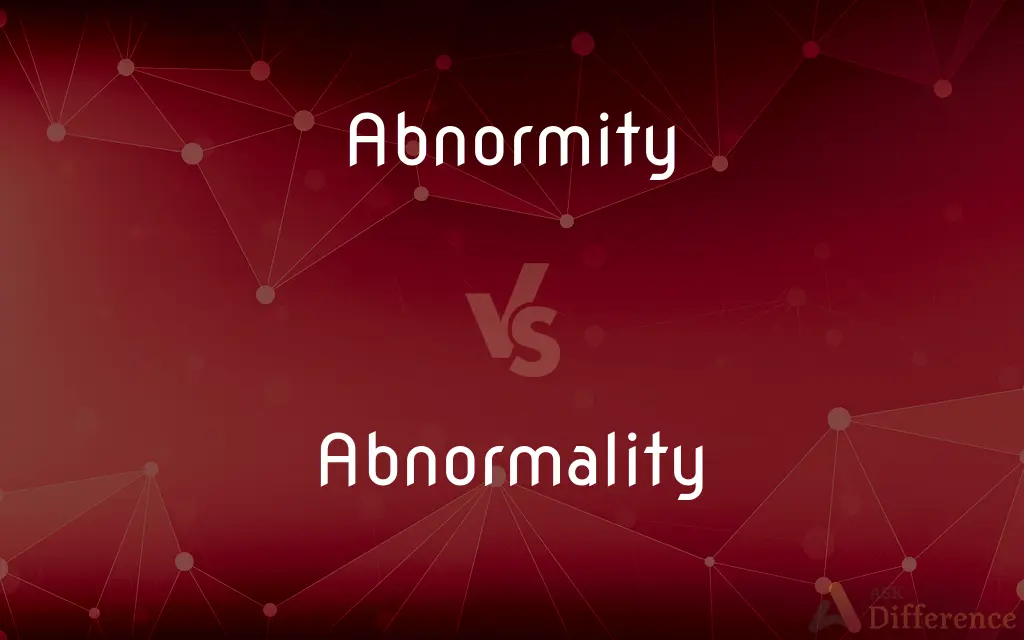Abnormity vs. Abnormality — What's the Difference?
By Fiza Rafique & Urooj Arif — Updated on April 21, 2024
Abnormity refers to a quality of being abnormal, typically implying a significant deviation from norms; abnormality, on the other hand, generally denotes a less severe or statistical deviation from what is typical or expected.

Difference Between Abnormity and Abnormality
Table of Contents
ADVERTISEMENT
Key Differences
Abnormity often suggests a marked or grotesque deviation from the norm, which can be seen in cultural or moral contexts. Whereas abnormality is used more broadly in medical, statistical, or general contexts to describe variations from the norm that may not necessarily be extreme.
In literary use, abnormity might be employed to describe characters or scenarios that are bizarre or out of the ordinary in a striking way. On the other hand, abnormality is more clinically or academically used to describe conditions or behaviors that deviate from a defined standard, without the connotation of extremity.
Abnormity conveys a sense of something being not only different but unnaturally so, often carrying a negative connotation. Abnormality, while also used to denote divergence from the norm, can refer to both benign and harmful deviations and is less likely to imply a judgment.
In the field of ethics or aesthetics, abnormity might be used to highlight qualities that are perceived as morally or aesthetically out of bounds. Abnormality, however, is often discussed in contexts like psychology or biology, focusing on measurable departures from typical patterns or averages.
Abnormity is less commonly used in everyday language and tends to appear more in philosophical or critical discussions. Abnormality, in contrast, is widely used across various disciplines, including medicine, psychology, and education, making it a more familiar term to the general public.
ADVERTISEMENT
Comparison Chart
Usage Frequency
Less common, more philosophical
More common, widely used in various fields
Connotation
Often negative, implies grotesque deviation
Neutral or negative, implies deviation
Context
More likely used in cultural, moral discussions
Broadly used in medical, psychological contexts
Severity
Implies a significant, often shocking deviation
Can refer to any degree of deviation, often milder
Typical Usage
Used to emphasize the extremity of deviation
Used to describe deviations without focus on extremity
Compare with Definitions
Abnormity
An extreme deviation from what is normal or expected.
His abnormity in behavior became apparent during social events.
Abnormality
A condition that is considered not normal in society.
The film highlighted the challenges faced by those who are marked by social abnormality.
Abnormity
The quality of being abnormally different.
The abnormity of the sculpture made it a focal point of the exhibit.
Abnormality
A deviation from the normal or average.
The medical test revealed an abnormality in his heart function.
Abnormity
A condition or fact of being grotesque or abnormal.
The novel explores the abnormity of a dystopian society.
Abnormality
The state or quality of being abnormal.
Geneticists study the abnormality of chromosomes to understand diseases.
Abnormity
A noticeable and unusual feature that deviates from a norm.
The architectural abnormity of the building drew mixed reactions.
Abnormality
An irregular feature or characteristic.
The abnormality in the data was enough to warrant further investigation.
Abnormity
Marked strangeness as a consequence of being abnormal.
The abnormity of her ideas often isolated her from her peers.
Abnormality
Something that is not usual, typical, or regular.
They noticed an abnormality in the pattern of bird migration.
Abnormity
(rare) abnormality
Abnormality
The state or quality of being abnormal; variation; irregularity.
Abnormity
A monstrosity
Abnormality
Something abnormal; an aberration; an abnormal occurrence or feature.
Abnormity
Departure from the ordinary type; irregularity; monstrosity.
Abnormality
The condition of not being normal.
Abnormality
A phenomenon or occurrence that is not normal.
Abnormality
The state or quality of being abnormal; variation; irregularity.
Abnormality
Something abnormal.
Abnormality
An abnormal condition
Abnormality
Retardation sufficient to fall outside the normal range of intelligence
Abnormality
Marked strangeness as a consequence of being abnormal
Abnormality
Behavior that breaches the rule or etiquette or custom or morality
Common Curiosities
Are abnormity and abnormality interchangeable in scientific research?
In scientific research, abnormality is preferred due to its precise, neutral connotation concerning statistical or observed deviations, while abnormity is less likely to be used because of its emphasis on extremity and qualitative judgment.
Can the use of abnormality in clinical settings affect patient perception?
Yes, labeling a condition as an abnormality in clinical settings can affect how patients perceive their own health, potentially causing feelings of being atypical or deviant, which can impact mental health.
Is abnormality always related to medical conditions?
No, while often used in medical contexts, abnormality can refer to any deviation from the norm in a variety of settings, including statistics and behaviors.
How does the perception of abnormity impact societal views?
The perception of abnormity can influence societal views by highlighting what is considered significantly outside societal norms, potentially leading to stigmatization or increased awareness of cultural differences.
What is the primary distinction between abnormity and abnormality?
Abnormity usually implies a significant or grotesque deviation, while abnormality refers to a broader range of deviations, often less extreme.
Can abnormity have positive connotations?
Typically, abnormity carries a negative connotation, emphasizing a notable deviation from what is considered normal or acceptable.
How are abnormity and abnormality used differently in literature?
Abnormity is often used to describe bizarre or striking deviations, enhancing a narrative's drama or thematic depth, whereas abnormality might describe characters or situations that are unusual but less exaggerated.
How does language evolution affect the use of abnormity and abnormality?
As language evolves, the usage of terms like abnormity and abnormality can shift, potentially leading to changes in how these deviations are perceived and discussed in both professional and casual discourse.
What is the role of cultural context in determining abnormity or abnormality?
Cultural context plays a significant role, as what is considered abnormity or abnormality can vary widely between different societies and traditions, depending on their norms and values.
What educational approaches are taken to teach about abnormity and abnormality?
Educational approaches often involve clarifying the meanings and connotations of each term, using examples from medicine, sociology, and psychology to illustrate how deviations from norms are understood and treated in various contexts.
Can abnormality be a neutral term?
Yes, abnormality can be used neutrally to describe deviations without implying a judgment about those deviations, unlike abnormity which often has a negative slant.
What contexts are most suitable for using the term abnormity?
Abnormity is most suitable in discussions involving philosophical, moral, or aesthetic considerations, where the extremity of deviation is emphasized.
Is there a psychological impact associated with the diagnosis of an abnormality?
Yes, being diagnosed with an abnormality can have psychological impacts, including anxiety or a changed self-image, as individuals process how their deviation from the norm affects their identity and life.
What are the implications of misusing abnormity and abnormality in public discourse?
Misusing these terms in public discourse can lead to misunderstandings or misrepresentations of individuals or groups, potentially reinforcing stereotypes or incorrect assumptions about what is considered normal or acceptable behavior.
How do abnormity and abnormality differ in legal contexts?
In legal contexts, abnormality might be used to describe behaviors or conditions that affect understanding or responsibility, while abnormity is rarely used, as its more extreme connotation is not typically relevant to legal discussions.
Share Your Discovery

Previous Comparison
Seek vs. Search
Next Comparison
Brick vs. StoneAuthor Spotlight
Written by
Fiza RafiqueFiza Rafique is a skilled content writer at AskDifference.com, where she meticulously refines and enhances written pieces. Drawing from her vast editorial expertise, Fiza ensures clarity, accuracy, and precision in every article. Passionate about language, she continually seeks to elevate the quality of content for readers worldwide.
Co-written by
Urooj ArifUrooj is a skilled content writer at Ask Difference, known for her exceptional ability to simplify complex topics into engaging and informative content. With a passion for research and a flair for clear, concise writing, she consistently delivers articles that resonate with our diverse audience.














































